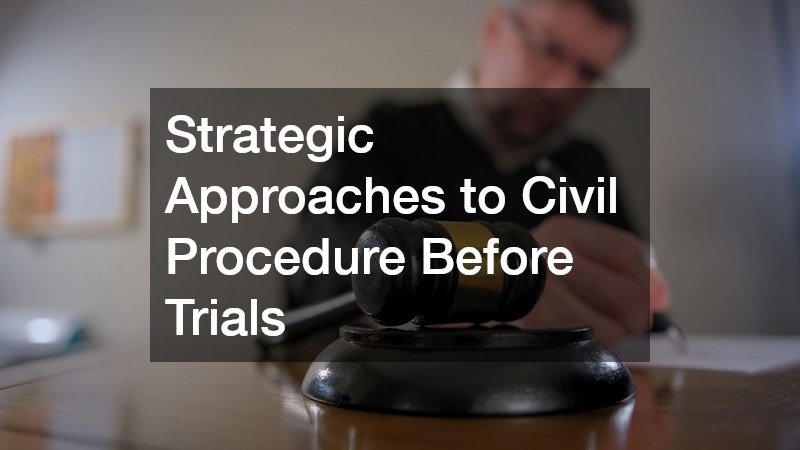
This article delves into the strategic approaches tailor-made for civil procedures before trials. The journey through pre-trial activities plays a pivotal role in laying the groundwork for successful legal outcomes. From mastering pre-trial conferences to leveraging discovery, understanding these elements can significantly steer the direction of legal proceedings.
How to Effectively Prepare for Pre-Trial Conferences?
Pre-trial conferences are instrumental in establishing the framework and dynamics for the forthcoming trial. One of the cornerstones of effective preparation lies in thorough case assessment.
This involves sifting through all available materials to identify strengths, weaknesses, and areas needing clarification. By collating this information, legal teams can draft comprehensive case summaries and readiness statements that succinctly communicate their position to the court.
Another critical aspect of preparation is the formulation of a strategic agenda. Having a clear agenda helps in structuring discussions and negotiating strategies during the conference. It’s advisable for attorneys to approach these conferences with both flexibility and assertiveness, allowing for adaptations based on emerging details or judicial guidance.
Collaboration with opposing counsel can also set the tone for a successful pre-trial phase. By fostering open lines of communication, attorneys can address potential disputes related to evidence or procedural concerns before they escalate. Such cooperation not only expedites agreements on procedural matters but can also facilitate settlements, easing the path towards trial or resolution.
What Are the Best Practices for Discovery?
The discovery phase is a critical component in pre-trial strategy, serving as the mechanism through which parties gather pertinent information. To conduct discovery effectively, attorneys should begin with a well-crafted plan that outlines specific, relevant inquiries. Tailored discovery requests help in acquiring essential documents and testimony, which in turn formulate the factual grounding for a case.
Managing discovery demands meticulous organization. Tools such as a discovery chronicle system enable attorneys to track documentation, deadlines, and responses efficiently. Proper handling and review of these materials can uncover discrepancies or reinforce arguments, making thoroughness in discovery both a preventative measure and a proactive strategy.
Furthermore, maintaining ethical standards throughout discovery is paramount. Avoiding overbroad requests and ensuring compliance with evidentiary rules fosters a fair legal environment. By maintaining transparency and adherence to procedural regulations, lawyers enhance their credibility with the court, thus strengthening their case’s foundation before trial.
How to Navigate Motion Practice Effectively?
Motion practice plays a pivotal role in shaping the dynamics and trajectory of a case before trial. The strategic use of motions can lead to dismissals, favorable rulings, or the exclusion of damaging evidence. It begins with identifying those motions that align with the overarching goals of the case, thereby providing the most potential benefit.
Drafting and submitting motions require a deep understanding of the governing legal standards and persuasive argumentation. Attorneys should focus on clarity and precision to effectively communicate the basis and necessity of their requests. By crafting well-supported motions, legal practitioners can influence the court’s impression and decisions significantly.
Collaboratively engaging with opposing counsel regarding motion practice can often streamline proceedings. Pre-trial motions, when coordinated effectively, can result in expedited decisions and potential agreements that sidestep unnecessary conflicts. Such interactions are crucial for constructing a conducive atmosphere for both trial preparation and potential settlement discussions.
What Role Does Settlement Negotiation Play Before Trials?
Settlement negotiation is a vital pre-trial strategy that can conclude a case favorably without the uncertainties of a trial. Successful negotiations hinge on understanding the client’s goals, the strengths of the case, and the opponent’s vulnerabilities. By conducting a detailed risk-benefit analysis, attorneys can better gauge when a settlement is the most advantageous path forward.
A key to effective settlement negotiation is thorough preparation. Attorneys should come armed with facts, precedents, and potential scenarios to advocate for optimal outcomes. It’s essential to know the “walk-away” point to avoid unfavorable agreements that would not serve the client’s best interests.
Furthermore, exploring creative solutions during settlement discussions can lead to win-win scenarios. Flexibility and open-mindedness enable attorneys to propose alternatives and compromises that may meet both parties’ needs, avoiding the strain and costs associated with going to trial.
How to Utilize Alternative Dispute Resolution (ADR) Methods?
Alternative Dispute Resolution (ADR) methods, such as mediation and arbitration, offer viable paths for resolving disputes outside the traditional courtroom setting. Selecting the appropriate ADR mechanism involves assessing the nature of the dispute, the relationship between parties, and the desired outcomes. ADR can expedite resolution and reduce litigation costs significantly.
Mediation, in particular, facilitates a collaborative environment where a neutral third-party aids in negotiating an agreement. This method allows parties to explore creative solutions and maintain influence over the resolution process. Conversely, arbitration results in binding decisions and is preferred when confidentiality and expedited resolution are paramount concerns.
Strategic approaches to civil procedure before trials form the backbone of effective legal practices. By carefully preparing for pre-trial conferences, navigating discovery and motion practices, and engaging in settlement negotiations, attorneys can streamline the trial process or avoid it altogether. The utilization of ADR showcases the breadth of tools available in the pre-trial phase.



